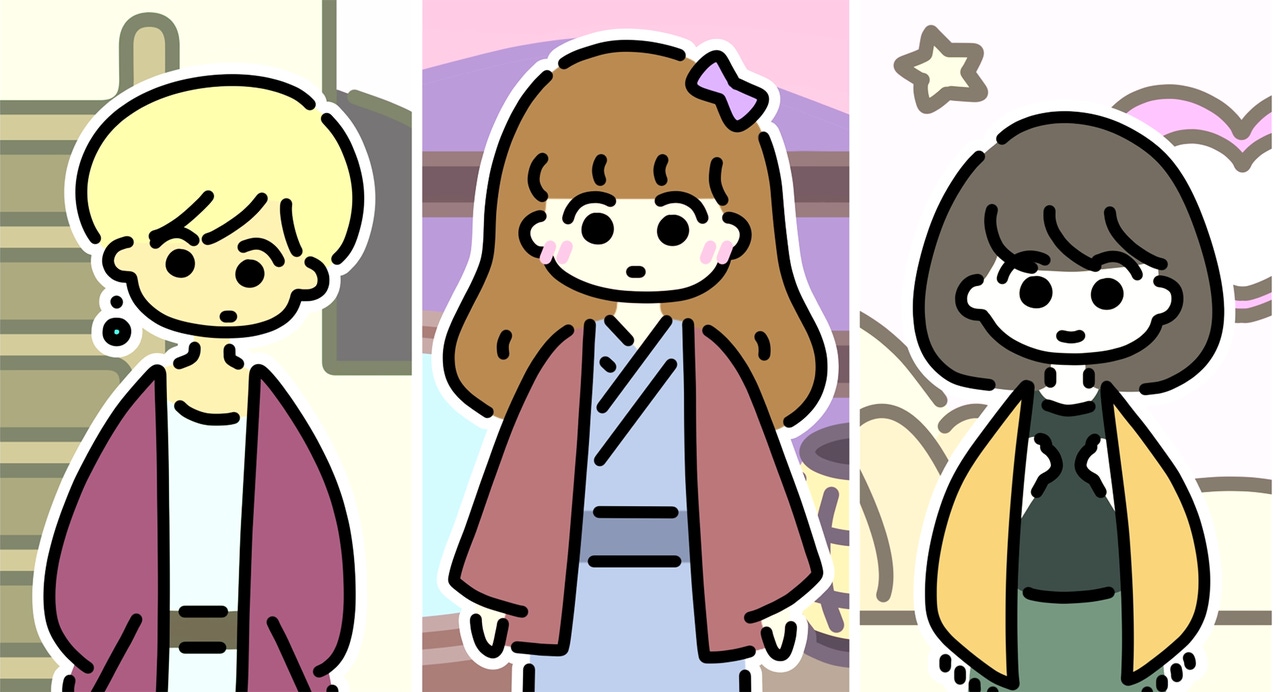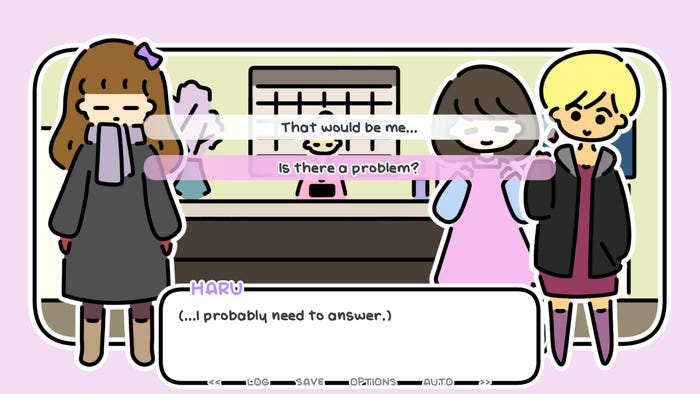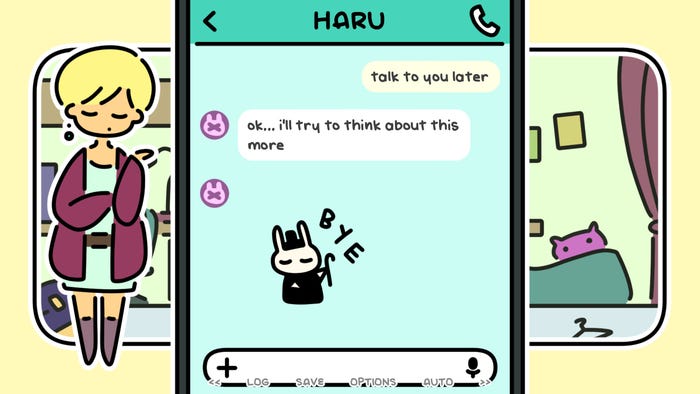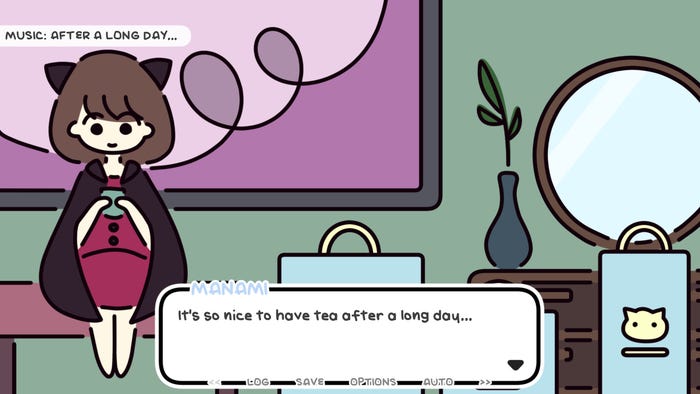Trending
Opinion: How will Project 2025 impact game developers?
The Heritage Foundation's manifesto for the possible next administration could do great harm to many, including large portions of the game development community.
This trio of stories delves into life as a trans woman living in Japan, the challenges queer people still face in getting rights in the country and exploring personal questions about their sexuality.

A YEAR OF SPRINGS is a trio of stories that explore the lives of three women, delving into life as a trans woman living in Japan, the challenges queer people still face in getting rights in the country and exploring personal questions about their sexuality.
Game Developer caught up with NPCKC, developer of the A YEAR OF SPRINGS collection, to talk about the positivity and responsibility that can come with sharing queer experiences, how creating them can be a means of forming your own hope for a better world and finding your own answers about yourself, and the unexpected ways in which sharing these stories can change your life for the better.
one night, hot springs explores the experience of a transgender woman going to the hot springs in Japan. What drew you to create this title? What interested you about sharing this story?
I can't remember the exact specifics anymore, but I read a news article that discussed an incident where an individual was thought to have been on the wrong side of the hot springs for their gender. The article itself didn't go into much detail, but I remember the comments online being mostly hurtful and disparaging, making assumptions about the individual that did not have any basis in the information shared in the article itself.
At the time I started making one night, hot springs, while I hadn't figured out exactly what labels I wanted to use for my own gender identity, I remember thinking how I didn't want to be in a world where somebody could read an article like the one I had and come up with the assumptions people were making online. So, I ended up making one night, hot springs, a game about how I'd like the world to become—one that isn't perfect but still tries to be kind.

You would go on to create a trio of games all connected to the lives of several women all facing different challenges, A YEAR OF SPRINGS. What led you to work through these varied perspectives?
Honestly, most of these games (and most of everything I make) is just me trying to figure stuff out and put it into words. I never intended for one night, hot springs to be more than just the one short game, but I ended up wanting to tell more stories from the perspectives of Erika and Manami as well, and it ended up as A YEAR OF SPRINGS.
In particular, the second game, last day of spring, was a response to the frustration I felt about how even as Japan brought in a new era, Reiwa—it felt like things were still moving so slowly with regards to rights for queer people here. The issues brought up in one night, hot springs, about how difficult it is for trans people to change their gender, are still fact at the point I'm answering this interview. Municipalities that recognize same-sex partnerships are becoming more common, but that is only within those specific municipalities, while same-sex marriage still is not a thing at a national level.
Meanwhile, spring leaves no flowers is more of a personal story. In the first two games, the character Manami does not seem to be outwardly queer, and she has trouble figuring stuff out because of that. I had the same issues when I was trying to figure out my identity—not that I've completely figured things out!—and making the last game in the trilogy was sort of a way to reassure myself and hopefully reassure other people who felt like me that it was OK to be unsure—to still be trying to figure things out, and to accept yourself, even if it isn't the "you" you thought you were.
How did you choose how you would express these stories? How did you shape them into games and narrative experiences?
I love visual novels and I love making visual novels, so it was natural for me to make these stories into visual novels. I think there is something very special about making choices and having them directly affect a story in a way you can easily see. Conversely, it can also be powerful to be given the illusion of choice only to find out that the choices you make don't make a difference in the overall scheme of things.
What challenges did you face in conveying these stories, both from a personal and a game design perspective? In capturing what you felt was important in each individual story?
Since some of the storylines in the game are on the heavier side, I wanted to make sure the games didn't make the player feel bad for making choices that took courage to select. For example, in one night, hot springs, the game does not punish Haru for opening up to a new acquaintance about some of the experiences she has had being trans. Similarly, in the last game, selecting choices that let Manami be a bit more honest with herself gives her the opportunity to open up to the people she cares about.

What thoughts went into creating each of the game's complex characters?
I think this is probably something everyone telling stories with minority characters encounters, but I don't want anyone to play something I make and then think that because Character A is Minority X, Character A somehow speaks for all people of Minority X. I don't want to write stereotypes, so I tried to make sure all of the characters felt like they could be real people that you might meet on the street. I tried to do this by fleshing out each character's background; there are so many scenes that I have written that don't actually ever show up in the game, but they provide the foundation for why each character thinks and talks and behaves the way they do, and I hope that helps makes the characters seem more alive.
The stories, while dealing with dark and challenging themes, have a sense of positivity or hope threaded through them. How do you deal with difficult topics without letting them be consumed with negativity?
I think it's because at the time I made each of these games, I was really exhausted with the world and I needed something to make myself feel a bit more positive too. I don't want to think that the world sucks, so I didn't want to make games where the world sucked. There's definitely a place for media that goes darker places and just stay dark, and I'm happy those media exist, but for me, I can get consumed in a negative spiral if negativity is the only thing I output. I wanted to let the characters in my games have happy endings, even if they aren't perfect.
What drew you to the art style for these games? How do you feel it shaped or affected the experience?
To be honest, I went with this style because it's one that I can draw! I'm not really a great artist, but as a dev who pretty much works solo most of the time, I can't afford to have somebody else make art, so I had to go with something I myself could draw the sprites and background art for. I think it worked out because with art that feels "cute" and a bit softer, it can be a bit easier to approach more challenging themes too, because the art feels reassuring even when the topics feel heavy.
What appealed to you about letting players experience life through the eyes of these women? Why do you feel it is important to let players immerse themselves in these stories?
I've often heard people tell me that they don't know any queer people in "real life" (and these people are categorically wrong because if they're talking to me, they know a queer person), so I think it's important to have games from different perspectives to let people know we exist at all.
How have players reacted to your work on these titles? What effects and changes have you seen in some of the people who play it?
This ties in to my previous answer, but I've had people comment things like how my games helped them understand their queer friend or family member better, or that it helped them figure out they were queer. It's incredibly humbling to have my games reach people in this way, and at the same time it terrifies me, because I'm just one person making games and I don't want to have that much influence over anybody's life. I made these games when I was still figuring stuff out myself and there are many things that I wish I articulated better.
I have also had my share of weird people on the internet harassing me over the game, mostly from people who do not like queer people, but sometimes from other queer people who think I haven't portrayed queerness accurately enough or that I am not queer enough to be making a game about queer people, etc. etc.. Harassment from the first group I can usually just brush off, but the second group stings. Fortunately, the positive responses far outweigh the negative, and in the end, if somebody plays my game and is happy they played it, it makes me happy too.

Were you personally affected in any surprising, unexpected, or touching ways through your work creating the various games in A YEAR OF SPRINGS? What positive things came from its development for you?
As somebody who never really thought of being a game dev and probably doesn't look like what most people think a game dev would look like, it's been an honor to have A YEAR OF SPRINGS played by so many people and shown in shows all over the world. The response to A YEAR OF SPRINGS has given me the courage to continue to keep making games about topics that are important to me because I know there are people who also care about the same things I do.
one night, hot springs was the first game I ever put on Steam (though the game was first released on itch.io) and I remember thinking that the larger audience there would be harsher than itch.io, but I found that there's an audience looking for queer stories everywhere, Steam included. It's partly thanks to this game that I'm a full-time indie dev now—I never would have even thought it was possible without it, so in that sense, this game has changed the course of my own life too.
You May Also Like